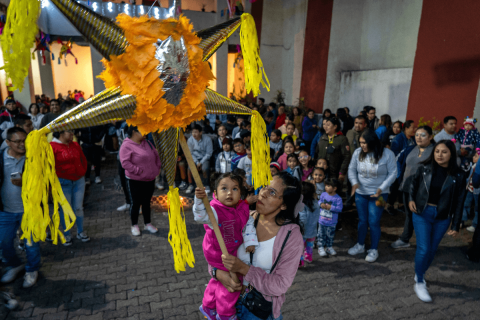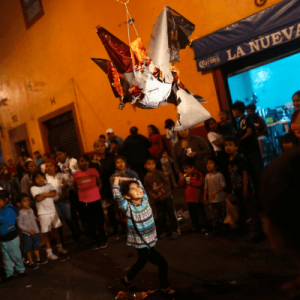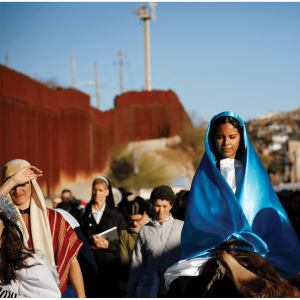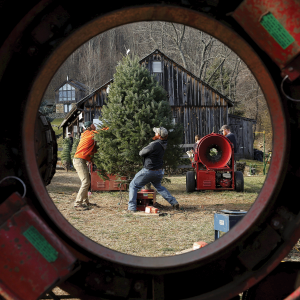
Community practices—from board games and processions to special food and songs—can be a fun and meaningful way to celebrate the holidays.

The 1992 classic is full of wonders you can’t find anywhere else: Michael Caine starring in a children’s movie, a ghost of Christmas future that haunts me every time I consider splurging on frivolities, and a drum set at a Victorian England Christmas party. But the movie isn’t just a fun, Muppet-y take on Charles Dickens’ classic novella; it’s also a compelling screenplay with heart-warming, humorous songs that offer a radical Christmas message of “cast down the mighty … send the rich away empty.”

My first experiences of Christian sacraments, including baptism and the Eucharist, were mysterious and somewhat confusing. As a Catholic little girl, I didn’t remember my infant baptism and could never quite wrap my head around eating Jesus’ flesh and drinking his blood. What’s more, these solemn events happened within the confines of a giant, cavernous church — a place where I had to be still, quiet, and serious. During weekly Mass, I learned implicitly from the nuns that reverence and fun do not go together.
Expanding our spiritual and ethical imaginations through play.

WHEN ELIZABETH MAGIE invented The Landlord’s Game, known today as Monopoly, she drew up two sets of rules: one “monopolist,” employing fierce competition and cutthroat property snatching, as the game is played today; the other “anti-monopolist,” namesake of a larger movement intended to demonstrate the dangers from unregulated wealth accumulation by the few and economic inequity in the late 1890s. Magie hoped that soon “men and women will discover that they are poor because Carnegie and Rockefeller, maybe, have more than they know what to do with.”
For Magie, daughter of an abolitionist and anti-monopolist, game creation was not simply an innocent pastime. She resonated with how games could provide a way to envision a new reality and usher in robust ideas.
When I was in college, several of my classmates in a world Indigenous literature class talked about how games we grew up playing—from Monopoly to Settlers of Catan—embodied settler colonialism and capitalism. In Settlers, the goal is to build as much as you can in unoccupied land and accumulate resources. In Monopoly, you aim to procure ownership of as many properties on the board as you can, raising rent to force other players into bankruptcy while you elude jail. Ticket to Ride-USA encourages players to build railroads across the United States, invoking the forces of manifest destiny without a critical lens. Jamaica is a board game where European pirates surround the island and battle for the most resources. Bang! The Dice Game catalogs life in the “Wild West,” where the French, Mexicans, and “Indians” fight each other; one dice roll can “save” a player from an “Indian attack.”
"Food brings people together."

THURSDAY NIGHT is baking night at Panadería El Latino on 11th Street. Early Friday morning, the bakers pull their weekend supply of pan dulce from the ovens. Racks and racks of conchas, cuernos, and galletas—in eye-popping yellows and pinks—are set out to cool. The entire street is redolent with yeast, cinnamon, and sugar.
From the outside this bakery looks like any another boarded-up building. “The only indication this isn’t a crack den,” one local points out, “is the overwhelmingly delicious smell of baked goods.” El Latino distributes to corner bodegas across the metro D.C. area. But, if you brave the exterior, you can get three sweet rolls for a buck. Bread of heaven!
Extending our tables to feed the multitudes is a practice Jesus asks us to imitate (Matthew 14:16). When Jesus hosted that feast for “more than 5,000” with “only five loaves and two fish,” it was called a miracle. But the mystery wasn’t in magic math. Rather this is a tale of two parties. In Matthew 14:13-21, the dilemma was that there was too little food and too many people. But in the preceding verses, there was too much food and too little humanity.
Matthew 14:1-12 tells the story of Herod’s birthday party. Here, only the upper 1 percent, the elite and powerful, are gathered in a setting overflowing with the rarest wines, mountains of meat, and the finest breads. But Herodias’ daughter demands a different dish. The main course is served to her on a platter: It is the head of John the Baptist.

In my favorite home video ever, it’s 2020 and my kids are opening their Christmas morning gifts while wearing new ski jackets, even though it was 75 degrees in South Texas, where we live. My son’s 4-year-old hands are still pudgy, and he hasn’t learned to glide his “l” sounds yet, so his raspy morning voice is extra adorable. As he unwraps his gifts, he shouts and cheers and stares at some Power Rangers in adoration.
Reenacting Mary and Joseph’s travels from one side of the border to the other.

Jennifer Guerra Aldana helps organize the annual Posada Sin Fronteras in San Diego/ Tijuana. She spoke with Sojourners’ Jenna Barnett about the tradition, which reenacts Mary and Joseph’s travels as described in Luke’s gospel.
“Las Posadas is a Catholic tradition in which community members set up a pilgrimage. People go door to door singing songs, wanting to be let in. And at every door, the innkeeper does not let them in. At the last home, the people do get let in, and there’s a party with tamales and candy. Posada Sin Fronteras [The Inn Without Borders] takes place at the San Diego-Tijuana border. We treat San Diego as the innkeeper and Tijuana as the one who is asking to be let in.

One carol I’ve been humming this Advent is “I Saw Three Ships Come Sailing In.” It’s not one I grew up singing, but I love it. The most popular contemporary lyrics talk about “three ships come sailing in” to Bethlehem on Christmas morning. Bruce Cockburn says the weird lyrics are the result of English folk in the 18th century hallucinating from eating too much ergot in their moldy English bread. Certainly there were no ships sailing into landlocked Bethlehem.
How Michael Tabor fights against climate change on his Christmas tree farm.

WHEN I STARTED farming, 52 years ago, I knew it would take 15 to 20 years to plant Christmas trees without chemical fertilizer sprays and colors. Most commercial trees are sprayed with deep dark green. We get requests to mail the trees. We won’t do that because of the carbon footprint. If anything, we’re a little too idealistic. We started renting live trees in pots. They’re cedars. So, it doesn’t look like that perfect tree. Plastic trees are very questionable. A lot of people want a tree that looks like a plastic tree. They want a tree that has a certain look. We defy that.